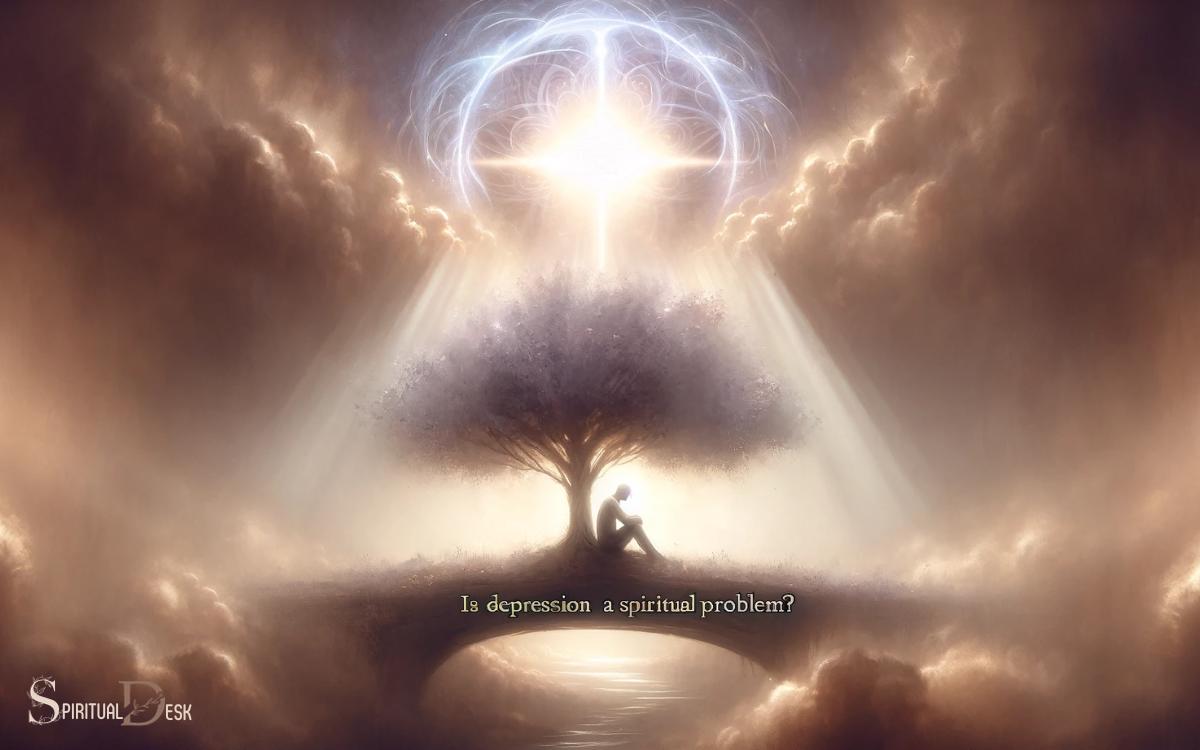Is Depression a Spiritual Problem? Find Out Here!
Depression is primarily recognized as a mental health disorder that can have multiple causes, including biological, psychological, and environmental factors.
It is characterized by persistent feelings of sadness, loss of interest, and a variety of emotional and physical problems.
While some individuals and cultural perspectives may consider depression a spiritual problem, it is important to approach it as a multifaceted condition that can benefit from a range of treatments including therapy, medication, lifestyle changes, and support groups.
Depression’s complexity lies in its ability to intertwine with an individual’s overall well-being, which can include their spiritual life.
For some, spiritual beliefs and practices play a role in their experience of depression and their means of coping with it.
However, it’s crucial to understand that spiritual interpretations or interventions should not replace evidence-based medical treatments.
Instead, they can complement traditional treatment plans for those who find personal value in incorporating their spirituality into their recovery process.
While exploring the spiritual dimensions of depression may provide comfort and meaning for some individuals, clinical depression requires professional health care for effective management and recovery.

Key Takeaway
Exploring Depression: Spiritual Dilemma or Medical Condition
| Aspect | Depression as a Spiritual Problem | Depression as a Medical Condition |
|---|---|---|
| Definition | A state of spiritual emptiness or a feeling of disconnection from the divine or one’s spiritual beliefs. | A medical condition characterized by persistent feelings of sadness, loss of interest, and other emotional and physical symptoms. |
| Perspective | Spiritual or religious | Medical or psychological |
| Causes | – Spiritual disconnection. – Lack of purpose or meaning. – Karmic lessons. – Existential crisis | – Chemical imbalances in the brain. – Genetics. – Traumatic life events. – Stressful environments |
| Recommended Healing | – Prayer or meditation. – Spiritual counseling. – Strengthening faith or spiritual practices | – Medication (antidepressants). – Psychotherapy. – Lifestyle changes (diet, exercise). – Support groups |
| Belief Systems | May be influenced by different religious or spiritual beliefs which can dictate understanding and coping mechanisms. | Based on scientific research and evidence, less influenced by individual belief systems. |
| Support | – Faith community support. – Spiritual leaders or mentors. – Like-minded individuals | – Health care professionals. – Mental health advocates. – Family and friends providing practical support |
Understanding Depression From a Spiritual Perspective

How can spiritual perspectives contribute to our understanding of depression? In the realm of mental health, spiritual perspectives offer a unique lens through which to view and comprehend depression.
Many individuals find solace and meaning in their spiritual beliefs, and these beliefs can significantly influence their understanding of depression.
For some, spirituality provides a framework for coping with the challenges of depression, offering a sense of purpose, hope, and connectedness.
Exploring the spiritual dimensions of depression can shed light on the existential and transcendent aspects of human experience, providing valuable insights into the multifaceted nature of this condition.
Understanding the spiritual dimensions of depression can help us appreciate the holistic and complex nature of human suffering, paving the way for a more comprehensive approach to addressing mental health challenges. This leads us to explore the role of beliefs in depression.
Exploring the Role of Beliefs in Depression

When exploring the role of beliefs in depression, it becomes evident that individuals� deeply held convictions can significantly impact their experiences of this mental health condition.
Beliefs about oneself, the world, and the future can shape one�s perception of reality, influencing emotional well-being.
Here�s a brief overview of how beliefs can affect depression:
| Types of Beliefs | Impact on Depression |
|---|---|
| Core Beliefs | Fundamental views about oneself, others, and the world can deeply influence mood and self-worth. |
| Automatic Thoughts | Negative automatic thoughts can exacerbate feelings of hopelessness and despair. |
| Belief Systems | Cultural, religious, or societal belief systems may contribute to feelings of alienation or inadequacy. |
| Self-Efficacy Beliefs | Beliefs about one�s ability to cope with life�s challenges can affect the severity of depressive symptoms. |
| Beliefs About the Future | Pessimistic beliefs about the future can perpetuate feelings of despair and worthlessness. |
Understanding the role of beliefs in depression is crucial for developing effective interventions and support strategies.
The Influence of Spiritual Practices on Mental Health

Spiritual practices have been shown to have a significant impact on mental health outcomes. Research indicates that engaging in spiritual practices can lead to improved mental well-being through various mechanisms:
- Stress Reduction: Spiritual practices such as meditation, prayer, and mindfulness have been linked to reduced stress levels, which can in turn alleviate symptoms of anxiety and depression.
- Enhanced Resilience: Regular participation in spiritual activities has been associated with greater resilience in the face of adversity, enabling individuals to better cope with life�s challenges and setbacks.
- Increased Social Support: Many spiritual practices involve communal activities, fostering a sense of belonging and social support which are crucial for maintaining good mental health.
These findings highlight the potential of spiritual practices as valuable tools for promoting mental wellness.
Examining the Connection Between Trauma and Spirituality

The connection between trauma and spirituality remains a complex and compelling area of study, with an increasing body of research shedding light on the interplay between these two domains.
Trauma can profoundly impact an individual�s spiritual beliefs, practices, and experiences. For some, trauma may lead to a deepened spiritual connection as they seek solace, meaning, and understanding.
However, for others, trauma can create a rupture in their spiritual beliefs, causing feelings of abandonment, anger, or disbelief.
Spiritual beliefs and practices can also serve as a source of resilience and healing for those who have experienced trauma.
Understanding the relationship between trauma and spirituality is crucial for providing comprehensive support and care for individuals navigating the complex interplay of these deeply intertwined aspects of human experience.
Addressing Stigma and Misconceptions in Spiritual Communities

Addressing stigma and misconceptions in spiritual communities is crucial for creating a supportive environment for individuals struggling with depression.
Spiritual beliefs can sometimes contribute to the stigmatization of mental health issues, making it essential to educate and promote understanding within these communities.
Integrating mental health into spiritual practices and fostering compassionate support systems can help break down barriers and provide much-needed assistance to those in need.
Spiritual Beliefs and Stigma
The stigma surrounding mental health within spiritual communities can perpetuate misconceptions and hinder individuals from seeking necessary support and understanding.
Addressing stigma and misconceptions in spiritual communities is crucial for fostering a supportive environment for individuals struggling with mental health issues.
Here are three key points to consider:
- Education: Providing education about mental health and the intersection with spiritual beliefs can help dispel myths and reduce stigma within spiritual communities.
- Open Dialogue: Encouraging open and non-judgmental discussions about mental health can create a safe space for individuals to seek help without fear of stigma or discrimination.
- Supportive Resources: Offering access to mental health resources and support networks within spiritual communities can aid individuals in finding the help they need while aligning with their spiritual beliefs.
Integrating Mental Health
Integrating mental health into spiritual communities requires a thoughtful and comprehensive approach to dispelling misconceptions and fostering support for individuals struggling with mental health issues.
Many spiritual communities hold stigmatizing beliefs about mental health, viewing it as a sign of spiritual weakness or moral failing.
To address this, education and open dialogue are essential. Spiritual leaders can play a pivotal role in normalizing discussions around mental health, emphasizing that seeking professional help is not at odds with spiritual beliefs.
By promoting understanding and empathy, spiritual communities can create a safe space for individuals to seek support without fear of judgment.
This integration of mental health support within spiritual communities can lead to a more holistic approach to well-being, recognizing the interconnectedness of mental, emotional, and spiritual health.
This shift towards a more comprehensive approach to well-being also necessitates the establishment of compassionate support systems within spiritual communities.
Compassionate Support Systems
Compassionate support systems within spiritual communities are crucial for dispelling misconceptions and fostering understanding of mental health challenges.
To effectively address stigma and misconceptions in spiritual communities, it is essential to:
- Educate: Provide education on mental health issues, including depression, within spiritual communities to increase awareness and understanding.
- Encourage open dialogue: Create safe spaces for individuals to openly discuss their mental health struggles without fear of judgment or stigma.
- Promote empathy and acceptance: Foster an environment where empathy, support, and acceptance are prioritized, helping individuals feel understood and valued.
Integrating Holistic Approaches to Depression Treatment

As we explore the intersection of spiritual and mental health in the context of depression, it becomes imperative to consider the integration of holistic approaches to treatment.
This involves examining alternative therapy options that encompass the physical, emotional, and spiritual aspects of an individual�s well-being.
By delving into the potential benefits and challenges of such holistic treatments, we can gain a deeper understanding of their role in addressing depression.
Spiritual and Mental Health
Several holistic approaches to depression treatment incorporate spiritual and mental health practices to address the individual�s well-being.
This integration recognizes the interconnectedness of the mind, body, and spirit, and aims to provide comprehensive care for those suffering from depression.
Here are three key elements of integrating spiritual and mental health practices into depression treatment:
- Mindfulness and Meditation: Utilizing mindfulness-based practices and meditation techniques can help individuals develop a deeper awareness of their thoughts and emotions, promoting emotional regulation and resilience.
- Counseling and Therapy: Incorporating spiritual beliefs and values into counseling and therapy sessions can provide a sense of meaning, purpose, and hope, which are essential for individuals grappling with depression.
- Community Support and Connection: Engaging in spiritual communities and support groups can offer a sense of belonging, social support, and comfort during challenging times.
Alternative Therapy Options
Integrating holistic approaches to depression treatment involves exploring alternative therapy options that prioritize the interconnectedness of mind, body, and spirit.
These alternative therapies can complement traditional treatments and offer a more comprehensive approach to addressing depression.
Here are some alternative therapy options that have shown promise in supporting individuals with depression:
| Therapy Option | Description | Potential Benefits |
|---|---|---|
| Acupuncture | Involves the insertion of thin needles into specific points on the body to help alleviate symptoms of depression. | May help reduce depressive symptoms and improve overall well-being. |
| Yoga | Combines physical postures, breathing exercises, and meditation to promote relaxation and reduce stress levels. | Can improve mood, reduce anxiety, and enhance overall mental health. |
| Herbal Medicine | Utilizes natural herbs and plants to create remedies that may help alleviate depressive symptoms. | Some herbs have shown potential in reducing anxiety and depression. |
These alternative therapy options offer individuals a more holistic approach to managing depression, addressing not only the symptoms but also the interconnected aspects of the mind, body, and spirit.
Conclusion
It is important to recognize the spiritual aspect of depression and its impact on mental health. By understanding the role of beliefs, spiritual practices, and the connection between trauma and spirituality, we can address stigma and misconceptions in spiritual communities.
Integrating holistic approaches to depression treatment can provide a more comprehensive and effective way to support individuals struggling with depression.
As the saying goes, �The mind is everything. What you think you become.� �The mind is everything. What you think you become.�
This quote highlights the power of our thoughts and the impact they have on our lives. It emphasizes the importance of cultivating positive and empowering thoughts to shape our reality and create the life we desire.






